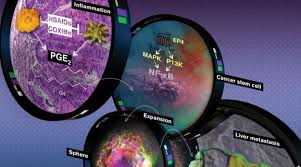Study Discovers Colon Cancer Tricks The Body To Spread

A study[1] published online in the Gastroenterology journal on August 07, 2015 identified a mechanism colon cancer uses to metastasize to the liver and throughout the body.
Colon cancer is the third most common form of cancer in men[2] and women[3] in the United States. Not only is its rate of risk a concern, its ability to spread quickly is equally troubling. Scientists have at least identified that inflammation caused colon cancer cells helps the cancer cells to spread.
Prostaglandin E2 (PGE2) is a pro-inflammatory fat the body uses in its acute inflammation process to heal itself. PGE2 collects around injured or infested areas of the body and triggers an immune response to send immune cells.
Normally, this is a welcomed and healing response. With cancer, the body is constantly making PGE2 and unfortunately colorectal cancer cells use this to their benefit.
The research showed that PGE2 binds with the colorectal cancer cell PGE receptor 4 (EP4) receptor, and triggers the cancer stem cells to multiply and become resistant to chemotherapy.
The colon cancer cells trick the body into producing more PGE2, and the cancer cells bind to the PGE2 and use it as a “life raft” to escape to other parts of the body, including the liver.
The researchers noted:
“When we treat these stem cells with PGE2, we found that they are 1,000 times more metastatic than the cells we don’t treat with PGE2.”[4]
The researchers were able to develop a drug that stops the binding of the PGE2 to the colon cancer EP4 receptor, which reduced the number of colon cancer cells, formation of polyps, and blocked liver metastasis.
[1] Prostaglandin E2 Promotes Colorectal Cancer Stem Cell Expansion and Metastasis in Mice
[2] Cancer Among Men
[3] Cancer Among Women
[4] Links between inflammation and colon cancer metastasis
Tags: anti-cancer, cancer awareness, colon cancer






